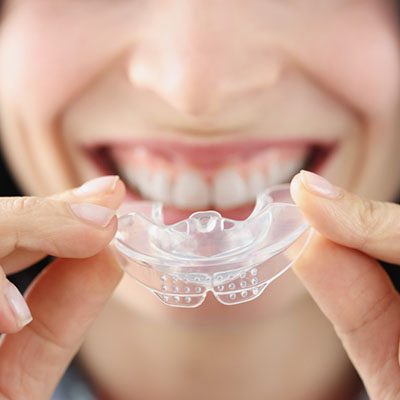Occlusal Splints
Occlusal Splints Thornton
 Occlusal splints, commonly called night guards, are dental devices designed to protect teeth from damage caused by bruxism, a condition characterised by grinding or clenching, typically during sleep. These appliances also treat temporomandibular joint (TMJ) disorders, relieving jaw pain, headaches, and other related symptoms.
Occlusal splints, commonly called night guards, are dental devices designed to protect teeth from damage caused by bruxism, a condition characterised by grinding or clenching, typically during sleep. These appliances also treat temporomandibular joint (TMJ) disorders, relieving jaw pain, headaches, and other related symptoms.
Purpose and Benefits
The primary purpose of occlusal splints is to minimise bruxism-related wear and tear by establishing a barrier that safeguards between the upper and lower teeth. This is crucial for maintaining dental health, as chronic grinding can lead to tooth fractures, enamel loss, and increased sensitivity. Occlusal splints also aid in managing TMJ disorders by creating a more relaxed jaw position when sleeping, easing pain, and lessening the tension on the jaw muscles and joints.
Types of Occlusal Splints
There are several types of occlusal splints, each tailored to specific needs:
Made from a pliable material, these are generally recommended for individuals with mild bruxism. They are comfortable and easily adjusted but may wear out faster than more rigid materials.
Constructed from a rigid acrylic, these splints are durable and suitable for severe cases of bruxism. They offer a precise fit and provide significant protection against tooth damage.
Combining the best of both worlds, these splints feature a soft interior for comfort and a hard exterior for durability. They are ideal for moderate to severe bruxism.
Specifically designed for TMJ disorder treatment, these splints help reposition the jaw to reduce stress on the TMJ and alleviate associated symptoms.
Custom vs. Over-the-Counter
Occlusal splints can be custom-made or purchased over the counter (OTC). Dental professionals fabricate custom splints using moulds of the patient’s teeth, ensuring a precise fit and maximum effectiveness. OTC night guards, while more affordable, often lack the fit and durability of custom options, potentially offering less protection and comfort.
Maintenance and Care
Proper maintenance of occlusal splints is essential for their longevity and effectiveness. They should be cleaned daily with a toothbrush, non-abrasive toothpaste, or a designated cleaner to prevent bacterial buildup. Storing the splint in a ventilated case when not in use also helps maintain hygiene and avoid damage.
When to Consult a Dentist
If you suspect bruxism or TMJ disorders, it is advisable to consult a dentist. Signs to watch for include frequent headaches, jaw pain, worn teeth, and disrupted sleep. A dentist can thoroughly examine, diagnose the condition, and recommend the appropriate type of occlusal splint.
Occlusal Splints in Thornton
If you think you may have bruxism or a TMJ issue, dental splints might be the proper treatment. Contact your Thornton, Maitland NSW dentist today.
Call us on (02) 4966 2996 to book your appointment online today!
Visit us at Thornton Shopping Centre, Shop 30/1 Taylor Ave in Thornton.
FAQs
What is an occlusal splint or night guard?
An occlusal splint, commonly known as a night guard, is a dental appliance worn over the teeth to prevent damage caused by bruxism (teeth grinding and clenching) and to alleviate symptoms of temporomandibular joint (TMJ) disorders.
Who should use a night guard?
If you have TMJ issues, clench or grind your teeth while you sleep, or feel headaches and jaw pain, you should consider wearing night guards or splints.
How do I know if I need a night guard?
Frequent headaches, jaw pain, worn or damaged teeth, tooth sensitivity, and disrupted sleep are signs that you might need a night guard. A dentist can diagnose bruxism or TMJ disorders and recommend the appropriate treatment.
How are custom night guards made?
A dentist makes an exact mould by taking an impression of your teeth. The night guard is fabricated in a dental lab to fit your teeth perfectly.
How long does a night guard last?
The lifespan of a night guard depends on the type and frequency of use. Soft guards typically last 6 months to a year, while complex and dual laminate guards can last several years with proper care.
How should I care for my night guard?
Use a toothbrush, non-abrasive toothpaste, or a special cleaner to clean your night guard daily. Store it in a ventilated case to maintain hygiene and prevent damage when not in use.
Can a night guard cure bruxism or TMJ disorders?
While night guards do not cure bruxism or TMJ disorders, they significantly reduce symptoms and prevent further damage to the teeth and jaw. They offer protection and respite, making it possible to tackle the underlying reasons with other therapies or lifestyle modifications.
Can I wear my night guard during the day?
Yes, if necessary. Some individuals with severe bruxism or TMJ disorders may benefit from wearing their night guard during the day, especially during activities that increase stress or clenching.
What should I do if my night guard becomes uncomfortable or damaged?
Consult your dentist if your night guard becomes uncomfortable, ill-fitting, or damaged. They can adjust or repair the device as needed.
How much does a custom night guard cost?
The cost of a custom night guard varies depending on the complexity and materials used.
Are there any side effects of wearing a night guard?
Some users may experience initial discomfort or increased salivation. However, these side effects usually subside as you get used to wearing the guard. If persistent issues occur, consult your dentist.
Can children use night guards?
Yes, children who grind their teeth can use night guards. Paediatric night guards are designed for growing teeth and should be fitted by a dentist.
How do I clean my night guard?
Clean your night guard daily with a toothbrush, non-abrasive toothpaste, or a designated cleaner. Do not use hot water, as it can deform the material. Regularly soak it in a denture-cleaning solution to ensure thorough disinfection.
